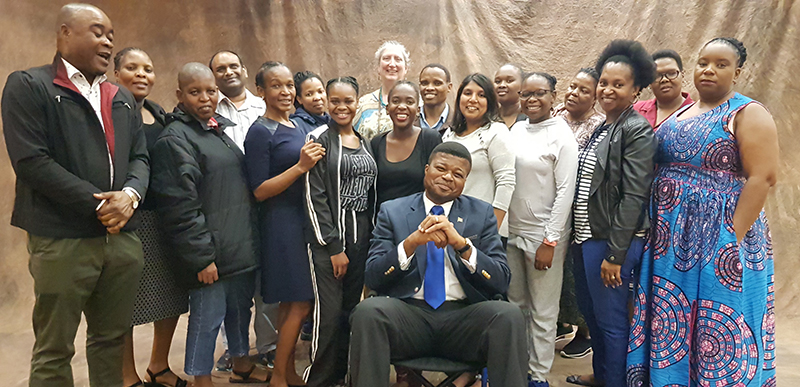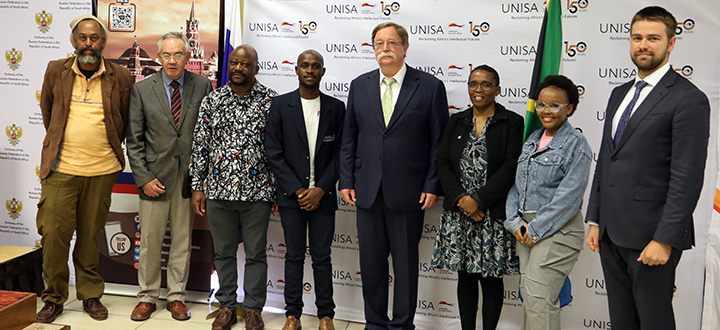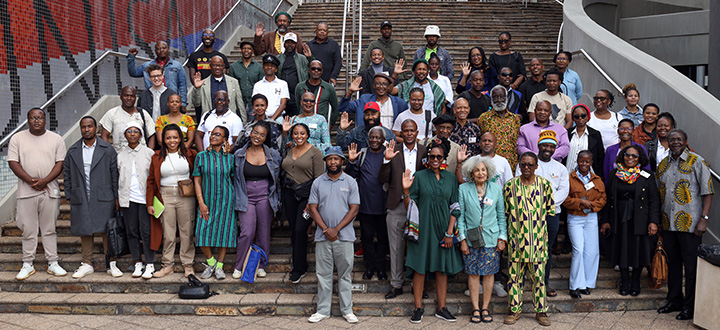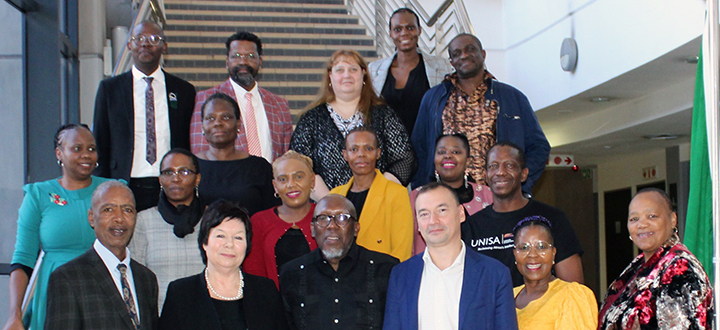News & Media
Designing for accessibility into ODeL
On 12-13 November 2019, the Centre for Professional Development (CPD), in collaboration with the HIV, Social Diversity Curriculum Integration and Inclusion Project, and the Advocacy and Resource Centre for Students with Disabilities (ARCSWiD) hosted a two-day seminar under the theme “Designing Accessibility into ODeL” at Unisa.

Presenters and delegates at the seminar.
The event was organised to raise awareness on the challenges and support needed by students living with disabilities, and to help the academic staff adjust their study materials and assessment tasks to be inclusive.
Presentations from different speakers dealt with accessibility issues, with input from stakeholders and students to foreground issues around assignments and exam questions, as well as multimedia study materials.
In his presentation entitled “Making content accessible: A problem-solution approach”, Deenah Moodley from ARCSWiD deliberated on issues and challenges faced by Unisa students with disabilities, and the type of support given by ARCSWiD. Moodley highlighted issues relating to teaching texts, study materials and assessment tasks. He further showed the audience how to properly assist students with disabilities, using various devices and activities.
Speaking about the curriculum integration of HIV, social diversity and inclusion to enhance access for students with disabilities, Dr Leon Roets from the HIV, Social Diversity and Curriculum Integration Project dealt with the topic of marginalised students and how Unisa can be more inclusive to create an enabling environment for them.
“We need inclusivity and universal design in making content accessible to help students with disabilities,” said Otsile Mohlake from the Reakgona Disability Centre of the University of Limpopo, emphasising that universities and organisations should remove the stigma and create safe environments for students. Mohlake facilitated mobility training exercises on the second day of the seminar to give participants some practical experience with various mobility training exercises and a sense of what it feels like to have certain disabilities.
On the other hand, Alice Goodwin-Davey from Centre for Professional Development discussed strategies for designing safe and accessible environments on myUnisa and gave guidelines on how to make sure that students can get easy access to texts, graphics, multimedia and online components.
The collaboration between these departments will continue in future, to host workshops that will design accessibility and cater for different issues that impact teaching and learning in an ODeL context.
E-connect spoke to attendees to gain their impressions of the seminar:
Fulufhelo Nenzhelele, College of Agriculture and Environmental Sciences
The seminar satisfied my expectation as I never felt like I am left behind with the presentations and practical sessions aimed at assisting students living with disabilities. It was challenging to put ourselves in their shoes through role playing, and I gained great respect for their resilience.
Tshegofatso Matsimbi, College of Human Sciences
We were taught about experiences of students living with disabilities in Unisa. It was recommended that Unisa should try to provide study materials and make the environment become more accessible for students with disabilities.
* By Lesego Ravhudzulo, Journalist: Department of Institutional Advancement
Publish date: 2019-11-21 00:00:00.0

 Unisa's student leadership engage with Russian ambassador
Unisa's student leadership engage with Russian ambassador
 Re-igniting and re-imagining Pan Africanism, Afrocentricity and Afrofuturism in the 21st century
Re-igniting and re-imagining Pan Africanism, Afrocentricity and Afrofuturism in the 21st century
 Unisa and Russian State University for the Humanities explore collaborative opportunities
Unisa and Russian State University for the Humanities explore collaborative opportunities
 Young Unisa science stars join elite Lindau Nobel Laureate group
Young Unisa science stars join elite Lindau Nobel Laureate group
 Education MEC addresses Unisa autism seminar
Education MEC addresses Unisa autism seminar